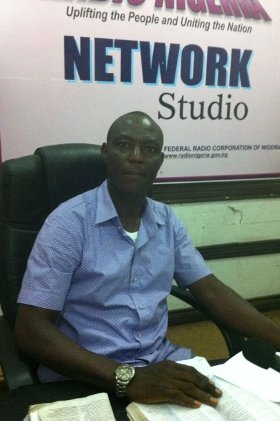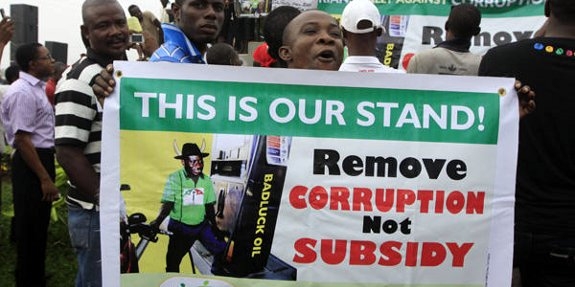A Nigerian troubleshooter
“Many Nigerians are dejected. They feel nothing can ever change, so they accept injustices and shrug their shoulders. I cannot be like that. I know that things can change. Those rapists are in jail and that hospital is functioning well now.”
Solomon Adebayo (42) is state broadcaster Radio Nigeria’s ace investigative reporter. In his now ten-year career he has unearthed secret city detention centers in the country’s government capital, Abuja; brought rapists in the presidential militia to book; exposed numerous corrupt scams and got a hospital ‘which was a quack clinic where many people died’ to function properly. After listening to Adebayo’s radio reports, one is left with puzzled surprise. So it is possible to improve Nigeria? Well, yes, it is, says Adebayo.

“Nigerians are used to so many things going wrong that everybody seems to have adapted. Even a father and mother who lost their baby in the quack clinic I reported on didn’t want to tell their story on radio. They thought it was just fate that their baby died. Meanwhile it wasn’t fate. It was malpractice.” The baby, one of twin babies born in breech position, suffocated because the clinic couldn’t carry out the needed Caesarean. Though an ultrasound had shown that twin babies were at risk and a Caesarean was indicated, the clinic did not refer the parents to a better equipped hospital. Reason: the parents were to pay good money for the delivery and the clinic’s director did not want the paying clients to leave.
Adebayo was informed of the case by the mother’s sister. “She was not the first one who had told me about that clinic. The director was a very rich woman who made her money because of the paying clients that she scammed. She ‘economised’ by employing non-qualified personnel and using sub-standard equipment, so the people were paying a lot of money for very bad service. Many people died there unnecessarily. So I had to convince the parents of the baby who died that they should come forward, not just for themselves, but for all these other patients who were still going to die there. Then when the Registrar got involved, the woman was removed and the clinic was professionalised, they were so surprised.”
The Registrar is a very honest man
So there is now at least one good hospital in Nigeria? “There are many good hospitals. The problem is not that there is no money or that we have no trained people, because we have both. We just need more functionaries who are serious about doing a good job. Like the Registrar of the Health Regulatory Committee who intervened after my report. He is a very honest man. He took my findings seriously and inspected the place the very next day. He got rid of the director, reorganised the hospital and ensured that compensation was paid to the victims. He also protected me from the director and her friends who were fighting back. She is well-connected to the governor. The Registrar told his people that no-one must give her my number or address.”
Corruption fights back, as they say. “It surely does. You get approached through friends, through family. They offer bribes or they threaten you. But there are also good people like this Registrar, who are on your side.”
The most dangerous investigation so far was the one into rapes carried out by a group of soldiers in the Presidential Guard over the December period last year. Women in Abuja – among whom were a hairdresser returning home from work, a mother hurrying to take care of her baby who had fallen sick, and students returning home after lessons – reported being kidnapped off the streets by soldiers in a military van. “They were taken to a certain park, beaten and raped, and also robbed of their money and possessions.” They had had no luck with the police when they reported the crimes. Even female police officers had not taken them seriously and accused them of being ‘harlots’. “But their stories made sense, and they were confirmed by security guards at the grounds where they had been raped. These security guards had been threatened too; these soldiers are well-armed, much better than they are.”
Adebayo’s colleagues, friends, relatives and wife discouraged him from pursuing the story. “These soldiers are very dangerous, so I understood the warnings. I even promised my wife that I would drop the story, but I didn’t. When she heard the first report, she understood that I was doing it anyway. She moved out with the kids, for their safety.” But the facts were the facts. “I had obtained the number plate of one of the vehicles they used. There was no denying.” The military had to act and the culprits were found, dismissed from the army and standing trial this year.
Another case involved the discovery of secret detention centres run by the Abuja Environmental Protection Agency (EPA), tasked with keeping the city clean and proper. Rather overzealously, the EPA used to round up traders, hawkers, bike couriers, street children and beggars, confiscate their wares and vehicles, and simply lock them up for long periods. “They denied that these centres existed, but I impersonated a bike courier who had been locked up and whose bike had been confiscated, and I got the whole story. I was even asked to pay a bribe to get my bike back, exactly as the formerly detained couriers had told me.”
The wife of the President
Radio Nigeria is a state radio, and management and colleagues often fear the stories Adebayo comes up with, because they ‘create so much trouble’. “But we get many listeners and awards, and the public appreciates what we do, so they actually like me. Even if it is difficult sometimes.” As a state radio, doesn’t it feel heat from the government when it touches on important corrupt interests? “Hah, I don’t know if we could expose something corrupt about the president himself. My manager could lose his job….but we once did report on a hospital scam, where people were fleeced of their money in exchange for quack treatments, where the wife of the President was involved. That time was really difficult! But we did that, too.”
Why don’t all journalists in Nigeria do this kind of investigative reporting? “I am not alone, there are quite a few more like me. But the majority don’t want to do risky stories. They just want to keep their head down and make a living. They suffer from the same attitude that I explained in the beginning: they think nothing can change. So they only think of personal survival, report some politician’s speech and collect money from him. To them, there are stories that make money and stories that don’t. Me, I believe something has to change and that it will change if one doesn’t give up. Wole Soyinka wrote that ‘The man in one dies when he keeps silent in the face of oppression.’ I believe in that.”
Evelyn Groenink is investigations editor of ZAM Chronicle


